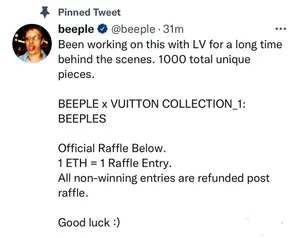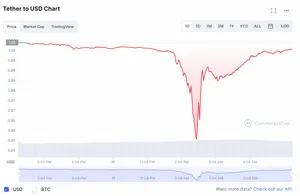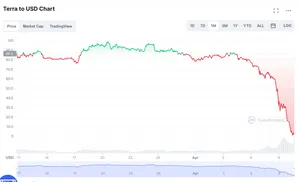It's not quite clear what happened, but it seems likely that it may have been a listing error. Onekiller had posted and then canceled listings for the ape several times in the past week and as recently as four hours before the sale, all between 250 and 145 ETH, suggesting that they had control of their account and made a mistake while entering the listing value.
Collector sells Bored Ape for $513,000 less than they paid for it
Technologists draft an open letter to US lawmakers urging them to responsibly legislate crypto industry
The Financial Times writes, "While individuals have made similar warnings about the safety and reliability of digital assets, it marks a more organised effort to challenge the growing influence of crypto advocates who want to resist attempts to regulate the frothy sector."
Solana network halted again
However, Solana has been plagued with stability issues, and on June 1 it was taken offline by its developers for what CryptoWhale says was the eighth time this year. This occurred only days after an incident in which the Solana blockchain clock drifted significantly behind real-world time.
Former OpenSea executive arrested, charged with money laundering
After leaving OpenSea in the wake of the allegations, Chastain began pitching a new NFT platform called "Oval" to investors, seeking $3 million in seed funding.
Chastain was arrested on June 1. The two charges he faces each carry a maximum sentence of twenty years in prison. The Attorney's Office described the charges as the first ever relating to insider trading of digital assets, and stated that, "today's charges demonstrate the commitment of this Office to stamping out insider trading — whether it occurs on the stock market or the blockchain."
- Press release from the U.S. Attorney's Office of the Southern District of New York
Toronto Comic Arts Festival sparks outrage by featuring NFT creator Saba Moeel, Moeel found to have widely traced her artwork
Moeel responded to the criticism in a slew of tweets, writing in one: "Why did i trace tank girl art? Why did Occidental soldiers raid the Iraqi national museum of art and steal all of our cultural artifacts and history? Many questions to answer". Moeef also accused those expressing concerns about her appearance of racism, and described them all as "people who love the central banking system". "Big organizations come out to try to destroy my community of 90% women, mostly WOC like me", she wrote.
One other TCAF featured guest, Ngozi Ukazu, withdrew from the Festival, writing, "Not only do I disagree with the platforming of NFTS, but I also will not be a featured guest alongside an influencer who traces art and explicitly commodifies Black culture." TCAF wrote on Twitter that they were preparing a response to "valid concerns", and the subsequent day announced that they had rescinded the invitation due to "code of conduct violations and the concerns expressed by the comics community".
Superlative Apes team does a "slow rug pull" after drawing in $2.9 million
The project has been plagued with issues including missed deadlines, accusations of plagiarism (somehow), and connections to another rug-pulled project. Additionally, a flawed staking contract required the team to have holders migrate their NFTs to a new contract — a slow and painful process that has resulted in most of the NFTs being "stuck" in a temporary contract. People who have questioned the project or accused them of rug pulling have been banned from the Discord and blocked on Twitter.
Despite the team's repeat (though very infrequent) claims that the project is still going and is not a rug pull, this appears to be a classic "slow rug" — that is, when a project team engages just enough to keep the community from accusing them of wrongdoing, while still effectively abandoning the project. On May 7, a former community moderator for the project stepped down, publicly stating that "the team has all but given up on the project, they come back every 4 weeks to put forth just enough 'minimal' (understatement) effort to not get sued", and accusing the project team of not paying them as agreed.
Another bug affecting Terra's Mirror Protocol loses the project $2 million (and counting)
Terra sleuth FatMan wrote on Twitter on May 30, "So far, the mBTC, mETH, mDOT and mGLXY pools have been drained. In around 12 hours, the market feed will kick in, and the attacker will be able to drain all of the mAsset pools (such as mSPY and mAAPL, mAMZN, etc.)". He begged Mirror developers to fix the oracle, writing that they are "completely MIA".
Another Bored Ape owner makes a typo, sells NFT for $180,000 less than they intended
The trader later confirmed on Twitter that it was their mistake rather than an account compromise or some other hack: "Yep, was a fat finger. Was trying to list at 105. Never thought it'd happen to me. Devastating."
Meanwhile, the NFT's new owner has it listed for sale for 110 ETH (about $219,000), which will net them a tidy profit if they find a buyer.
Luna 2.0 airdrop sends 2.1 million $LUNA to Mirror Protocol thief
The price of the new $LUNA token has been volatile on its first day, starting at around $17 and later valued around $5.70. This would make the attacker's holdings of airdropped tokens worth around $12.1 million, assuming they could find liquidity to cash out.
- Tweet thread by FatMan
- Luna price on CoinGecko
PokeMoney blockchain game rug pulls for $3.5 million
The project creators claimed it was a hack, and stuck around to try to keep the hope alive. They claimed on Telegram that for some reason they couldn't access the project Twitter account, and so couldn't inform their community of the hack. They also began rallying their community around hopes for a project relaunch. Meanwhile, they announced a "CHAT MUTE UNTIL TOMORROW TO AVOID FUD" — as any reputable, not-rug-pulled project would do, I'm sure.
Elon Musk deepfake tries to get people to give scammers Bitcoin
According to BleepingComputer, only about $1,700 in deposits appeared to have gone to addresses associated with the scam, although they acknowledged that the addresses are likely rotated and so the true amount may be larger.
Someone brought the scam to Musk's attention on Twitter, where he replied, "Yikes. Def not me." The YouTube channel hosting the videos was taken down shortly after.
Bitso lays off around 10% of staff
Bitso is a major Latin American exchange, with mor than four million users across Mexico, Argentina, Colombia, and Brazil.
Researcher discovers vulnerability in the Terra Mirror Protocol that allowed attackers to siphon tens of millions from the project
FatMan discovered one instance where a person deposited $10,000 and later withdrew $4.3 million. According to FatMan, they found repeated exploits of this type that earned attackers "well over $30 million". Another researcher on Terra forums estimated about $88 million had been exfiltrated from the project in this way, over the many months the bug went undiscovered and unpatched by Mirror developers.
Solana loses track of time
Blockchain timekeeping is also selling point of Solana, which talks up its "proof of history" algorithm in a blog post where Solana Labs co-founder Anatoly Yakovenko says, "our clocks never drift".
Terra decides to release "Terra 2.0", because apparently the way to fix a crypto catastrophe is with more crypto
Billy Markus, one of the original creators of the Dogecoin cryptocurrency (both of whom have since left the project), tweeted, "luna 2.0 will show the world just how truly dumb crypto gamblers really are".
Scammer steals 29 Moonbirds NFTs nominally worth about $1.5 million from a single collector
The highly exclusive group of NFT collectors known as Proof Collective, of which this trader was a member, was reportedly preparing a report for the FBI and police. Because the attacker used an exchange that requires KYC there may be some possibility that their identity could be traced, although falsified KYC is also increasingly common.
The WeWork founders are starting a carbon credit crypto company and they already raised $70 million in funding
The company has already raised $70 million in token sales and a Series A funding round led by Andreessen Horowitz (aka a16z), which seems like a startling amount of money to give to someone who resigned from his previous company amidst accusations of some serious self-dealing and the creation of toxic corporate culture.
DecentraWorld project rug pulls for $1 million
Representative Madison Cawthorn under ethics investigation related to crypto, violated STOCK Act
On May 26, Cawthorn filed a disclosure to say he had bought between $100,000 and $250,000 of the "Let's Go Brandon" ($LGB) coin on December 21 — eight days before posting that the coin would "go to the moon" just before a deal with NASCAR was announced. The coin then went up in price and Cawthorn sold at least $100,000 of his holdings. This timing led to accusations that Cawthorn had advance knowledge of the partnership.
Cawthorn also disclosed in the same May 26 filing that he bought between $101,000 and $265,000 of Ethereum in late December. Although Congressmembers are required by the STOCK Act to disclose purchases of various assets (including cryptocurrencies) within 45 days of the transaction, Cawthorn's disclosure came five months after the purchase. Cawthorn recently lost his primary, ending his chances of re-election, but his current term isn't slated to end until January 2023.
- Statement of the Chairman and Ranking Member of the Committee on Ethics Regarding Representative Madison Cawthorn
- "Rep. Madison Cawthorn discloses 2021 ‘Let’s Go Brandon’ cryptocurrency purchase days after ethics probe announced", CNBC
- "GOP Rep. Madison Cawthorn failed to properly disclose 'Let's Go Brandon' and Ethereum cryptocurrency purchases", Business Insider
Crypto speculator loses over $200,000 to wallet compromise
Reid traced the stolen funds until they disappeared into the crypto exchange "Fixed Float". Reid contacted the exchange, who told him they couldn't supply him with server logs without a law enforcement request. Reid wrote that he was "angry [with] the fact they cant provide me with any details to help me follow the trace" and urged crypto Twitter to try to pressure the exchange to release more information to him.
Founder of Milady NFT project revealed to have horrifying history involving a 4chan suicide cult, white supremacist cult, and pro-anorexia grooming
"Charlotte Fang" originally tried to deny the connection, attempting to cover up the connections between their online aliases and encouraging others to lie and also cover up any mentions of the alter ego. However, they eventually admitted to their past, writing that it was "toxic baggage that's hurting Milady community & poisoning the vibe". They apologized for trying to hide the account, attempted to brush off their past actions as "trolling" that didn't reflect their "real views", announced they would be leaving the project team, and finished by saying they were "more bullish than ever for Milady".
Beeple's Twitter account is hacked and used to promote fake NFT mints
Various commenters replied to Beeple's tweet to say they'd been scammed, and to ask if he could help them recover their funds or NFTs. Some blamed him and his poor security practices for their losses, asking if he would repay those who were scammed. He has not suggested he intends to do so.
bDollar stablecoin suffers $730,000 price manipulation attack
- "又一算稳项目被攻击,bDollar损失约73万美元", DefiDaoNews
Class action lawsuit filed against HUMBL blockchain platform
HUMBL stock has dropped from a high of $6.84 per share to a low of $0.11. Similarly the BLOCK ETX asset has dropped more than 87% from its high.
- HUMBL lawsuit website
Doodled Dragons serial rug-puller revealed to be behind yet another Solana project
After the Balloonsville rug pull, which used the Magic Eden NFT marketplace, Magic Eden announced they would no longer be accepting anonymous projects on their platform. Despite that, this person was able to launch Reptilian Renegades on Magic Eden, where they were able to get their account verified.
Following the unmasking, the Reptilian Renegades Twitter account posted a slew of tweets supposedly exposing various NFT influencers for shady behavior including undisclosed promotions. "I'm literally the Batman. I stop crime whilst committing crimes," they wrote in response to a person who tweeted, "The balloonsville guy is back and he's ready to tell you how corrupt NFTs are while he steals from you. The lack of self awareness is truly next level."
Users threaten to sue after yield generation project Stablegains loses $44 million in Terra collapse
Unfortunately for their customers, it turned out that Stablegains was heavily invested in the Terra project's Anchor protocol, which collapsed along with the rest of the Terra ecosystem last week. Stablegains' website had stated they primarily generated yields through the asset-backed stablecoin USDC. However, after the collapse of Terra, Stablegains admitted that "All users' holdings are in UST" — which lost over 90% of its value.
"Quantum-resistant" blockchain QAN suffers bridge attack
QAN describes itself as a blockchain that helps "resist quantum attacks", though apparently not the types of bridge attacks that have become fairly common in the past year or so.
Class action lawsuits filed against Terra founders after crypto collapse
Another Korean group, calling themselves "Victims of Luna, UST coins", has amassed 1,500 members and reportedly plans to file a lawsuit against Kwon and Terraform Labs' other cofounder, Shin Hyun-Seong (who is also known as Daniel Shin, and is no longer with Terraform Labs).
This development may be particularly inconvenient for Kwon and Shin, given Terra's legal team quit the company the previous day.
On June 17, another investor filed a separate lawsuit against Terraform Labs, Kwon, and various others in a US court.
"Feminist Metaverse" token exploited for $533,000
The project advertised on its website its plans to "Create Feminist economics in the form of a DAO to balance the male-dominated world." The project's whitepaper explains how the metaverse will apparently "greatly reduce the impacts on women's normal work and inequality in wages brought by their physiological differences and pregnancy. As a consequence, it helps eliminating a number of unresolved problems in the real world like gender discrimination, inequality in wages, sexual harassments, sexual assaults, trafficking of women and child marriage." It's not clear what specifically the "Feminist Metaverse" project was hoping to achieve.
Fake minting links distributed after several large NFT Discord servers are compromised
Bot compromises have emerged as a wide attack vector in crypto and web3 communities, as widely-used bots can have elevated permissions across Discord channels used as official information sources across many communities.
Terraform Labs' legal team resigns
Four pricey NFTs stolen from actor Seth Green, complicating his plans for an animated series
The theft occurred on May 8, though Green only seemed to notice on May 17 when he tweeted, "Well frens it happened to me. Got phished and had 4NFT stolen."
The loss of the Bored Ape was later revealed to have put Green in a bit of a pickle, when he released the trailer for a new animated series he was developing that starred his pilfered primate. Given that BAYC ownership grants commercial usage rights (which are presumably transferred to the new owners when the NFT changes hands), the person who bought the NFT flipped by the phisher could have possibly brought a lawsuit against Green if he moved forward with the series.
Green ultimately spent about $300,000 to buy his ape back from the hacker.
American running "untraceable" service "designed to evade US sanctions" is charged after being traced
Though the country is as yet unnamed, the limited number of countries sanctioned in the way described in the decision allow us to deduce that it was either Cuba, Iran, North Korea, Syria, or Russia. This case marked the D.O.J.'s first criminal prosecution involving alleged use of crypto to evade sanctions.
U.S. Magistrate Judge Zia M. Faruqui wrote in the opinion: "Virtual currency is traceable. Yet like Jason Voorhees the myth of virtual currency's anonymity refuses to die. See Friday the 13th (Paramount Pictures 1980)."
Scream lending protocol racks up $35 million in bad debt after hardcoding not-so-stablecoin prices to $1
CZ admits Binance held Luna and UST in bizarre tweet threads
The following day, CZ tweeted, "Binance received 15,000,000 LUNA (at peak worth $1.6 billion USD, now not much) as part of the original ($3m) invest. 560x return at peak." In this tweet, "not much" glossed over the fact that these LUNA, obtained in return for a $3 million investment and at one point nominally worth $1.6 billion, are now worth $2,900.
He also wrote that Binance had 12,000,000 UST — worth $12 million when UST was properly pegged, and now worth $1.16 million (assuming liquidity exists to sell it at all).
Luna Foundation Guard reports what it did with its Bitcoin reserves, raising more questions
More than a few people were unsatisfied with this reporting, asking more transparency around who these "counterparties" were. Ultimately, this action benefited the "counterparties", providing liquidity to these whales who were able to exit their now risky UST positions for a good price, and did not help most of the individuals holding UST.
"Stable"coin DEI loses peg
This is another bump in the road for Deus Finance, which lost a total of $16.4 million in two separate flash loan attacks in March and April 2022.
Flash loan attacks on "Feed Every Gorilla" token take $1.9 million
Prior to these attacks, FEG had earned some notoriety from a May 2021 Vanity Fair article outlining an alleged pump-and-dump scheme, titled "Inside the Rise and Fall (and Rise and Fall) of Shit Coins". Despite the bad press, much of the FEG community maintained that the article was a smear and nothing more than an attempt by the author to create FUD. "You could literally take every token and this would apply to everyone..." wrote a moderator of the official FEG subreddit.
People continue to wait for a public accounting of what happened to Terra's $3.5 billion in Bitcoin reserves
Terraform Labs CEO Do Kwon tweeted on May 13 that "We are currently working on documenting the use of the LFG BTC reserves during the depegging event. Please be patient with us as our teams are juggling multiple tasks at the same time." It's not clear when this documentation will be released. Binance CEO Changpeng Zhao joined the group of people asking about the BTC reserves, tweeting, "I would like to see more transparency from them. Much more! Including specific on-chain transactions (txids) of all the funds. Relying on 3rd party analysis is not sufficient or accurate."
Blockchain insurance company InsurAce shortens their claims window for Terra holders to just a week
Altogether, InsurAce says they paid out about $11 million to around 173 claimants as a result of the depeg. Evidently there were 61 others who did not submit their claims within the deadline.
SpiritSwap is the latest victim of a domain hijacking attack
The hacker only managed to exfiltrate around $18,000 before being discovered, and SpiritSwap shut down their swapping through their router to prevent the attack from continuing.
MM.Finance suffered a similar attack earlier in the month, losing $2 million after an attacker gained control of the domain and swapped in their own address to siphon funds.
Phishing attack targets users of sites including Etherscan and CoinGecko
Crypto.com reverses some Luna trades, offers $10 consolation prize
On May 13, the company announced it would be reversing transactions made during an hour-long period on May 12 when "users who traded LUNA were quoted an incorrect price". Some users were able to profit off the discrepancy, but later were told that their transactions were being reversed. Crypto.com offered $10 in CRO, their cryptocurrency token, "for the inconvenience caused". Crypto.com halted Luna trading after discovering the issue, and it remains halted as of May 13.
The issue sounds quite similar to issues that affected various defi projects around the same time. Several projects who failed to account for unexpected Luna price data coming from blockchain oracles including Chainlink suffered major attacks.
- "LUNA Trading Incident on Crypto.com App", Crypto.com
Unexpected oracle data in the wake of Terra blockchain halt enables multiple attacks on other platforms
$13.5 million was fraudulently borrowed from the Venus protocol on BSC. Blizz Finance on Avalanche reported their protocol had been entirely drained, amounting to around $8.3 million. Blizz subsequently announced in a post-mortem that "Blizz has no treasury or development fund and a significant portion of the stolen assets belonged to our team. As such we regret to announce the protocol has been paused and we do not intend to resume operations."
FBI charges EminiFX CEO with fraud
Alexandre was sentenced to nine years in prison on July 18, 2023 and ordered to pay $249 million in forfeiture and $214 million in restitution.
Terra blockchain is halted after token crash increases threat of governance attacks
Terra only announced this after halting the network, giving their users no opportunity to try to withdraw funds. They have made no announcement about whether or when they intend to bring the network back online, although it seems safe to assume that the enormous loss of confidence in Terra would make any restart short-lived.
Tether loses peg, drops below $0.95
Tether began to recover somewhat as the day progressed, gradually returning to above $0.99. However, the de-peg has clearly shaken the cryptocurrency ecosystem. The heavy reliance on Tether means that a substantial or protracted loss of its peg would be devastating, and the open secret that Tether does not have the backing assets it once claimed has intensified fears about a possible run on Tether.
BitPrime exchange forced to pause trading due to lack of liquidity
- "Important Notice For All Customers", BitPrime
CoinDesk reports that Terra's Do Kwon was behind another failed algorithmic stablecoin project
Do Kwon has never disclosed his involvement with this failed project. CoinDesk wrote that although their "default position is to respect the privacy of pseudonymous actors with established reputations under their well-known handles unless there is an overwhelming public interest in revealing their real-world identities", there was now "such public interest as Kwon's UST stablecoin death spirals, wreaking havoc across the broader cryptocurrency market. Amid this precarious situation, investors deserve to know that UST was not Kwon's sole attempt at making an algorithmic stablecoin work." It was not made clear in the article when CoinDesk first learned of Kwon's connection to Basis Cash, though the authors later stated they'd learned of it the night before they published.
Terra $LUNA token drops in price by 98% amidst ongoing TerraUSD stablecoin collapse
Such a dramatic crash in a cryptocurrency that was in the top ten by market cap has been devastating to some. Some members of the Terra/Luna community on Reddit have spoken of being massively over-invested in Luna, with some describing losing their life savings and appearing to be in crisis.
- Luna/USD on CoinMarketCap
- National Helpline numbers






































